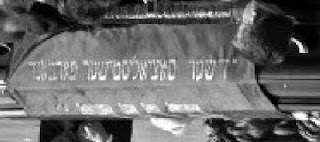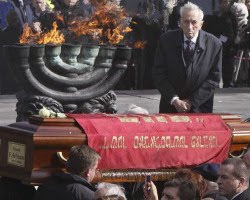 A sad farewell to Marek Edelman – the last surviving Commander of the Bund. The article below describes his funeral in Warsaw, where he was buried, although he lived in Poland’s second city, Lodz.
A sad farewell to Marek Edelman – the last surviving Commander of the Bund. The article below describes his funeral in Warsaw, where he was buried, although he lived in Poland’s second city, Lodz.
It is noticeable that apart from the attendance of Shevach Weiss, a previous Israeli Ambassador to Poland, in his personal capacity, there was no representation from the ‘Jewish’ State or any ‘national’ institution of Zionism.
Having tried to claim the Warsaw Ghetto Uprising for itself, despite the fact that Zionism from 1933 onwards collaborated with Nazism wherever it could, and opposed resistance as ‘unZionist’, in particular in breaking the anti-Nazi economic and cultural boycott, [see Edwin Black’s ‘The Transfer Agreement for details] it found Edelman an embarrassment.
Marek Edelman was not a mythical Massada figure or straight from central casting in Hollywood, but a real, live Jewish resistance fighter who had survived against the odds. The problem was that he was not a Zionist. Indeed, even worse. He had compared the fight of the ZOB, Jewish Fighting Organisation, to that of the Palestinians, whom he termed the Palestinian Fighting Organisations.
It was he, Edelman, who saw that the murderous racism of the Nazis was mirrored in Israel’s treatment of the Palestinians. So, as the article says, Edelman was treated like an embarrassing relative. Never to be mentioned. It was left to the Polish people, represented by their President, to pay their last respects to a uniquely remarkable man. So we should welcome that The State of Collaborators – Israel – not unnaturally decided to boycott the funeral, petty and vindictive to the last.
The article makes mention of the first Commander of ZOB, Mordechai Anielwicz of Hashomer Hatzair. In Israel Anielwicz’s role is used to associate Zionism with resistance whereas the opposite is the case. ZOB had to take out and assassinate members of the Jewish Police and the Judenrat (Jewish Council) most of whom were Zionists, including members of Hashomer Hatzair like Abraham Gancawajch.
But in fact members of the Zionist youth groups who took part in the Warsaw Ghetto Resistance rebelled not because of, but despite, their Zionist allegiance. They were both young, and therefore not hidebound by their bourgeois elders, but also they had an organisation. In any such situation, the mere fact of an organisation, regardless of the purposes for which it was formed, is an advantage in crystallising rebellion.
Indeed the conclusions that Anielwicz, who let us not forget was very young, drew are very interesting. Anielwicz’s who commanded ZOB, expressed his regret over the “wasted time” undergoing Zionist educational work.* Anielwicz went on to say that “had the fate of the Jews in 1942 lain in the hands only of the political parties (Zionist – TG), the revolt would never have taken place.” **
* Gutman p. 441 fn. 23.
** Yisrael Gutman, the Jews of Warsaw 1939-45, Ghetto, Underground, Revolt, Harvester Press, Brighton, 1994 , p. 143 citing Yitzhak Zuckerman and Council of Kibbutz Hi Meuhad 4/1945.,
Tony Greenstein
The Last Bundist
Marek Edelman dies last week. He was 90.
He was buried on Friday. Marek Edeleman was the last surviving member of the Warsaw Ghetto. He was one of the leaders of the Warsaw Ghetto uprising, and its last commander – after Mordechai Anelewicz was killed.
The President of Poland spoke at his funeral, held in the old Jewish cemetery of Warsaw. Two thousand people attended the grave-side ceremony. But no one from the Israeli government attended – though Israel’s former ambassador to Poland, Shevach Weiss, attended in a personal capacity. No official representative of any international Jewish organization attended either: not even from the Holocaust memorialization organizations. As far as I can tell, neither the Jerusalem Post nor Ha’aretz ran a story when Edelman died, nor any sort of eulogy. (Haaretz did run a short AP wire story about his funeral.)
Why is Edeleman mostly ignored while Anelewicz is lionized? (I lived for a year on Mordechai Anelewicz St. in Jerusalem, there is a kibbutz Kfar Mordechai named after him, his name and story is taught in every Israeli school, and in most Hebrew Schools around the world.)
Perhaps because he remained a firm anti-Zionist all his life. In pre-war Poland he was a leader of the “Bund” – the Jewish Socialist Party, that advocated for a “multi-cultural” solution for Jews within a socialist Poland. It dreamed of a thriving Yiddish based Jewish culture within a secular, multi-ethnic Poland – where significant minorities – like Jews and Ukrainians – would have cultural autonomy. The Bund was a significant party within the Polish Parliament of those years, and there where as many supporters of the Bund as there where Zionists among polish Jews of the 1930s. After the war Edelman remained in Poland, became a noted doctor, and later was active in the Solidarity movement that brought down Communism in Poland. In the 1990s, he served in the Polish Parliament.
In 2002, in the middle of the second intifada, Edelman wrote a letter to Palestinian resistance leaders. Though the letter criticized the suicide bombers, its tone infuriated the Israeli government and press. According to The Guardian, “He wrote in a spirit of solidarity from a fellow resistance fighter, as a former leader of a Jewish uprising not dissimilar in desperation to the Palestinian uprising in the occupied territories.” He addressed his letter to “To all the leaders of Palestinian military, paramilitary and guerrilla organizations – To all the soldiers of Palestinian militant groups“. This set up a howl of rage in the Israeli press, especially that Edelman had consciously used the terms that described the structures of the resistance movement in Warsaw.
I am struck by Edelman’s consistency throughout his life. He believed that Jewish liberation could only come through the liberation of the people among whom they lived, and he opposed Zionism as an escape from the Jewish responsibility to help liberate all people. He was too much of an anti-Zionist to move to Israel, and too much of a socialist to move to America. He also felt a responsibility to the few Jews remaining in Poland, and to the memory of all those who perished there. He saw no reason for a Jews to move in order to solve “the Jewish problem”. He believed that Jews should fight for their rights (and those of others) wherever they lived. He believed that a Jewish life could be lived anywhere. He remained a Bundist to the end.
The picture at the top of this posting is of Edelman’s funeral on Friday. The picture below is an enhanced close up of the banner that is draped over his coffin. It reads in Yiddish: Yiddisher Sotzailisicher Farbund – “The Jewish Socialist Bund.”
From Sydney Nestel’s Blog 